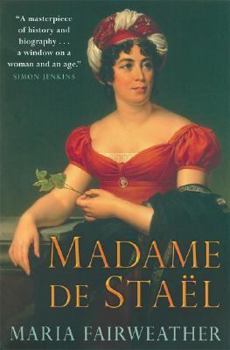Madame de Stael
Select Format
Select Condition 
Book Overview
In her lifetime it was widely said that there were three political powers in Europe--Britain, Russia, and Madame de Stael. Byron described her as "the first female writer of this, perhaps of any age," Germaine de Stael was certainly the most remarkable woman of her time and she remains unique--both for the scope of her artistic and intellectual achievements, and the force of her political influence which helped to bring down Napoleon. Born in Paris...
Format:Paperback
Language:English
ISBN:078671705X
ISBN13:9780786717057
Release Date:February 2006
Publisher:Carroll & Graf Publishers
Length:522 Pages
Weight:0.90 lbs.
Dimensions:1.6" x 5.6" x 8.8"
Customer Reviews
3 ratings
Detailed, contextualised, readable
Published by Thriftbooks.com User , 15 years ago
This recent bio of one of France's most amazing women is full of well-researched detail, very well referenced and yet readable (despite the irritating but, thankfully, infrequent habit of putting a comma between subject and verb) because Fairweather can tell a good story, engaging her reader with the lives and situations her work recreates. This is done with considerable empathy not merely for de Stael but for her friends, family and lovers. She accurately presents Germaine's husband as a ninny but tactfully refuses to say so in so many words. Fairweather reveals a detailed knowledge of events in France during de Stael's lifetime. Particularly good in her analysis of de Stael's relationship with her father, the formidable Necker. Irresistable for anyone with the least interest in the woman or her time.
A Christmas Memory
Published by Thriftbooks.com User , 17 years ago
As Christmas approaches nearer and nearer my mind strays to thoughts of Madame de Stael, who always kept a warm place for Christmas in her heart, even when persecuted by Emperors and forced to live in alien lands, or when reeling from the tragic loss in her life, the death (by duelling sabre) of one of her sons while still a very young man, and she, though heavy in mind, insisted on Christmas as normal so as not to disappoint the little ones, nor her pensioners whom she gathered around her like old, well-loved blankets. And her lovers, for she was a lover all her life. The poet George Stanley recommended this book to me, telling me that it seemed to him I knew nothing of de Stael and it was high time I learned. Immediately I ordered a copy of the recommended biography, but it looked a little dense, so I put it to one side, then wound up months later packing it hastily on my last minute trip to Basel this past summer. Well there I was in my single bed on top of a Basel garret, high summer and you could almost see the tops of the Jungfrau, and I opened the pages of the book and found out, to my utter surprise, that Madame De Stael was, in fact, from Basel! I swallowed this unbelievable coincidence with a twist of bottled water, and from there on in, I could see why George Stanley, whose own writing is filled with a boiling hunger for the human, and a restless quest for the divine, why a writer like Stanley would be so taken with the peripatetic Madame de Stael. She was everywhere and did everything, and she never stopped her love life. Maybe money helped. She was born Germaine Necker, the lively, bluestocking daughter of Jacques Necker, the man they called the Croesus of Switzerland, and in thinking about her life I would have to say that she was usually able to summon up vast amounts of money and yet still, she had sympathies with all sides of the French Revolution in which she played a key part. She was friends with Marie Antoinette, sort of, and with Talleyrand (and with Napoleon Bonaparte until he took an uninformed dislike to her and to her novels and agitprop). She wasn't the most beautiful woman in the world, not even in the top fifty per cent, but she had something, didn't she, an intelligence that Coleridge said matched his own, and a joie ve vivre that made men, women, children and animals stop in the street and turn around and stare, drawn to her ebullience like honey. Maria Fairweather has a telling anecdote about Madame de Stael attending the first French circus ever shown in snowy Moscow, in the company of famous Russians of all sorts, and the clowns and circus animl;s were all gazing in rapture at Madame de Stael chatting in the royal box, trying to make out scraps of her witty comversation. Even the acrobats on their trapezes gradually stopped swinging, hoping for that perfect moment of silence in which one might hear her speak. She was in love with many men, and many loved her; among them, Narbonne, the aristocratic w
Fantastic beyond belief
Published by Thriftbooks.com User , 18 years ago
Probably the most interesting transition in European history is from absolute monarchy to democracy, with the noticeable eddy of Napoleon's dictatorship. In literary history, the movement from pastoral romance to sturm und drang ROMANTICISM ranks among the most exciting: marivaudage and bucolic love à la Rousseau can only take you so far. In philosophy, you likewise have the jump from rationalism to Kantian metaphysics and empiricism. How can it be that one person stood at all these crossroads, cultural and political, and wrote thoroughly of them? But she was no mere observer, but a participant as well, probably the only person Napoleon ever feared.





